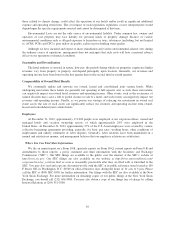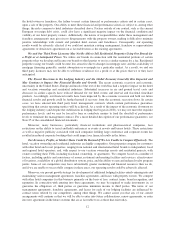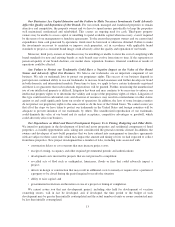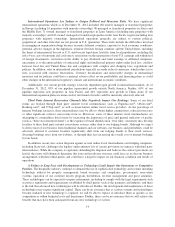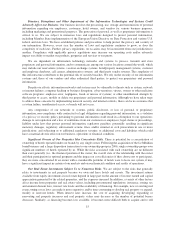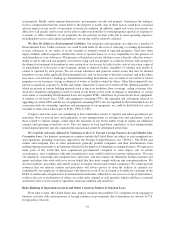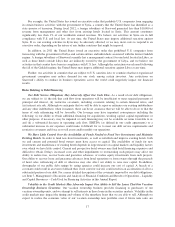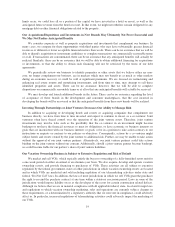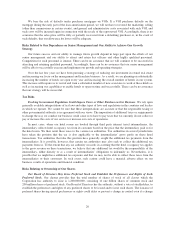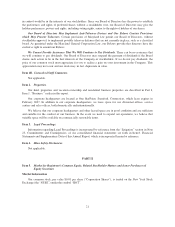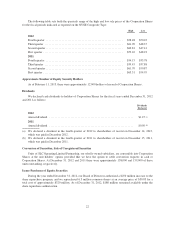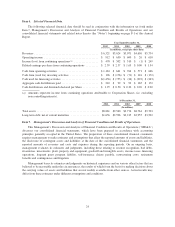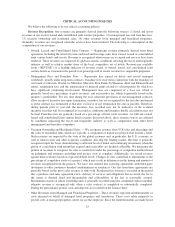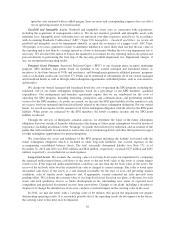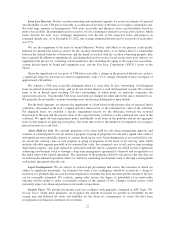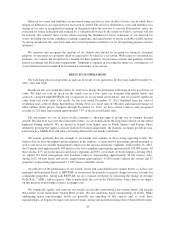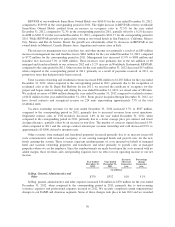Starwood 2012 Annual Report Download - page 119
Download and view the complete annual report
Please find page 119 of the 2012 Starwood annual report below. You can navigate through the pages in the report by either clicking on the pages listed below, or by using the keyword search tool below to find specific information within the annual report.We bear the risk of defaults under purchaser mortgages on VOIs. If a VOI purchaser defaults on the
mortgage during the early part of the loan amortization period, we will not have recovered the marketing, selling
(other than commissions in certain events), and general and administrative costs associated with such VOI, and
such costs will be incurred again in connection with the resale of the repossessed VOI. Accordingly, there is no
assurance that the sales price will be fully or partially recovered from a defaulting purchaser or, in the event of
such defaults, that our allowance for losses will be adequate.
Risks Related to Our Dependence on Senior Management and Our Ability to Achieve Our Growth
Strategy
Our future success and our ability to manage future growth depend in large part upon the efforts of our
senior management and our ability to attract and retain key officers and other highly qualified personnel.
Competition for such personnel is intense. There can be no assurance that we will continue to be successful in
attracting and retaining qualified personnel. Accordingly, there can be no assurance that our senior management
will be able to successfully execute and implement our growth and operating strategies.
Over the last few years we have been pursuing a strategy of reducing our investment in owned real estate
and increasing our focus on the management and franchise business. As a result, we are planning on substantially
increasing the number of hotels we open every year and increasing the overall number of hotels in our system.
This increase will require us to recruit and train a substantial number of new associates to work at these hotels as
well as increasing our capabilities to enable hotels to open on time and successfully. There can be no assurance
that our strategy will be successful.
Tax Risks
Evolving Government Regulation Could Impose Taxes or Other Burdens on Our Business. We rely upon
generally available interpretations of tax laws and other types of laws and regulations in the countries and locales
in which we operate. We cannot be sure that these interpretations are accurate or that the responsible taxing or
other governmental authority is in agreement with our views. The imposition of additional taxes or requirements
to change the way we conduct our business could cause us to have to pay taxes that we currently do not collect or
pay or increase the costs of our services or increase our costs of operations.
In most cases, where our hotel rooms are booked through third party internet travel intermediaries, the
intermediary collects hotel occupancy tax from its customer based on the price that the intermediary paid us for
the hotel room. We then remit these taxes to the various tax authorities. Tax authorities in several jurisdictions
have taken the position that the tax is also applicable to the intermediaries’ gross profit on these hotel
transactions. Tax authorities that take this position have generally sought the additional tax payments from the
intermediaries. It is possible, however, that certain tax authorities may also seek to collect the additional tax
payments from us. To the extent that any tax authority succeeds in asserting that the hotel occupancy tax applies
to the gross revenue on these transactions, we believe that any additional tax would be the responsibility of the
intermediary, either directly or as a result of intermediaries’ obligations to indemnify us. Nevertheless, it is
possible that we might have additional tax exposure and that we may not be able to collect these taxes from the
intermediaries or their customers. In such event, such actions could have a material adverse effect on our
business, results of operations and financial condition.
Risks Relating to Ownership of Our Shares
Our Board of Directors May Issue Preferred Stock and Establish the Preferences and Rights of Such
Preferred Stock. Our charter provides that the total number of shares of stock of all classes which the
Corporation has authority to issue is 1,200,000,000, consisting of one billion shares of common stock and
200 million shares of preferred stock. Our Board of Directors has the authority, without a vote of stockholders, to
establish the preferences and rights of any preferred shares to be issued and to issue such shares. The issuance of
preferred shares having special preferences or rights could delay or prevent a change in control even if a change
20


